|
by Gerry Krzic (K-41) and Paul Courtright (K-48) FOK Profile is an occasional feature of the FOK BLOG. It highlights the career stories of FOK members. The series kicks off with a fascinating look at the health care initiatives of Dr. Paul Courtright on the African continent and his continued links with Korea. 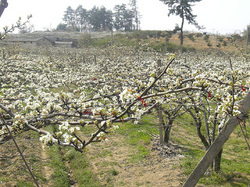 From http://briandeutsch.blogspot.com From http://briandeutsch.blogspot.com The PC Years: The Seeds Are Planted In spring the Korean countryside bursts into bright colors, the brown of winter gives way to the panoply of purple, yellow, pink from the azaleas, forsythia, and lilacs awakening from their winter slumber. In southwestern Korea – the area around the town of Naju is also splashed with the white buds of the flowering pear trees – which by the end of summer will turn into round, succulent pears, reputed to be the best on the peninsula. This fertile landscape of growth was a fitting place for a young Peace Corps Volunteer to find his calling in life – the seeds of a career in medical service planted in Korea would blossom some 6,000 miles away on the continent of Africa. 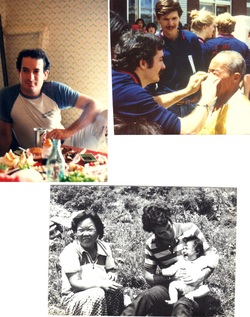 In 1979, Paul Courtright began his journey into international eye care as a member of the 48th Peace Corps Korea group (K-48). After the requisite three-month in-country training, he was assigned to Naju to begin his work as a Leprosy worker. Here is Paul's description of his Peace Corps time: "During the first year living in a leprosy resettlement village managing the various leprosy related conditions I became particularly interested in the eye conditions of my villagers. I was fortunate enough to link up with the only ophthalmologist in Korea providing eye care for leprosy patients and I spent one day a week with her (in Suncheon) learning about eye care. That led me to decide to write a grant and get funding to travel around to all of the leprosy resettlement villages, screen all of the leprosy patients for eye disease, provide treatment that I could, get a list of those needing surgery, and organize their medical and surgical care. That work took up the entire second year of my Peace Corps time. I felt incredibly fortunate to be able to travel all over Korea, get to some very remote areas (leprosy resettlement villages were often tucked away in difficult to reach places), meet interesting people, and get to do challenging work. I loved it -- when I was not frustrated, of course." 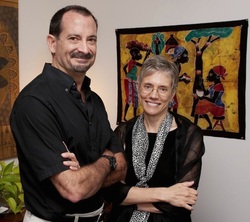 Post-Peace Corps: Blossoming in Africa Paul spent an extra year in Korea after Peace Corps -- explaining that he was not ready to leave the Land of the Morning Calm -- so he spent one year teaching at Seoul International School. After returning to America, he completed his Masters in Epidemiology and Doctorate in Public Health. Paul related that even before he started working on his Doctorate (1988), he "pretty much decided to focus on ophthalmology and work in developing countries." Except for 7 years at the University of British Columbia (1995-2001), Paul's career has been outside the USA and focused on the continent of Africa: Egypt (1985-86), Ethiopia (1989-90), Malawi (1990-1994), Tanzania (2001-2012), and now South Africa (2012-present). Paul has not been alone in these many ventures outside the U.S. --- his spouse of 26 years, Dr. Susan Lewallen, has partnered with him in their goal to provide quality eye care service and education to the African continent.  KCCO: Community Eye Care Initiatives in Africa Much of Paul and Susan's present work has grown from the outreach activities of the Kilimanjaro Centre for Community Ophthalmology (KCCO), which they established in Moshi, Tanzania in 2001. 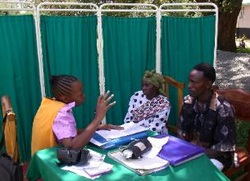 While KCCO is the largest centre of community ophthalmology in Africa, the staff is comprised of only 8 people with an annual budget of about $1.5 million. According to Paul, KCCO aims to provide training for ophthalmologists and other eye health professionals in topics such as planning, leadership, management, research, gender, and community outreach. The Centre's influence can be seen across the African continent; KCCO works with 14 different hospitals in Madagascar, Malawi, Zambia, Burundi, Tanzania, Rwanda, Uganda, Ethiopia, and Benin to increase the effectiveness and efficiency of eye care services. 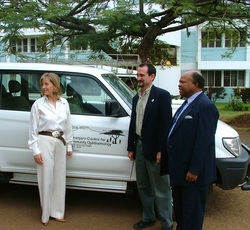 KCCO's research is operational in nature: how to improve and increase the use of services by women, approaches to more efficient trachoma control, and follow-up of children's surgery. A large part of Paul's time is also spent on trachoma; He is the Technical Lead for a large UK grant ($90 million over 5 years) for trachoma elimination in 5 countries; a second similar grant (6 more countries) from the UK government is expected in Spring, 2014. KCCO is also the lead agency, on behalf of a consortium of many different trachoma groups, producing preferred practice manuals for all aspects of trachoma control. Paul relates that KCCO's efforts have tripled or quadrupled the number of people getting cataract surgery (cataract being the leading cause of vision loss in Africa) without adding more staff --- as well as providing other eye care services. Paul and Susan's incredible work also includes research and collaboration with international agencies, including Korean organizations. 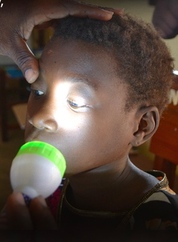 Cross-Fertilization: A "안녕하세요" Grows Programs with Korea Although Paul's work has carried him outside Korea, his links with Korea have not ended. In 2010, a representative from the Korean NGO, the Heart to Heart Foundation came to KCCO's Moshi office because he had heard about the organization's work; however, the visitor was in for a surprise as Paul introduced himself in Korean. This initial encounter has led Heart to Heart to support a number of KCCO projects: conducting a pediatric ophthalmology outreach in Burundi and supporting trichiasis surgery for women in northern Tanzania. The Burundi work was designed as a jumping off point to develop a nationwide eye care program for children in the country. Additionally, KCCO worked with Heart to Heart to prepare a successful proposal to KOICA so that KCCO will be working with Heart to Heart in Burundi for five years. 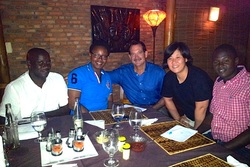 When Paul was in Korea in 2011 for one of the FOK Revisits, he was asked to give a talk at Yonsei University. This led to a connection with the Department of Ophthalmology there and an engagement with a project they have in Malawi. When Paul was in Malawi in February, 2014 facilitating Malawi's National Trachoma Elimination Plan, the Yonsei team joined. As a result, they made an application to KOICA for supporting aspects of trachoma elimination in Malawi. The project was approved and Paul will be meeting with KOICA in June, 2014 to discuss further steps KCCO will be working with Yonsei University, Heart to Heart, and KCCO Malawi colleagues on improving surgical skills in (trachoma) trichiasis surgery and setting up a health system for monitoring the uptake of surgical services and outcome. Paul will also be serving on Heart to Heart's Advisory Committee. 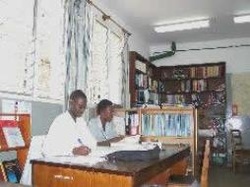 PC Reflections: Spreading The Right Seeds of Service When FOK asked Paul if his time as a Peace Corps Volunteer had any influence on his present career, he replied in one word: "Huge." Paul said that his time doing leprosy work led to eye care which led to his current career. He feels incredibly fortunate to have been able to do work that he loves: "the many, many eye care professionals I have had the pleasure to train and mentor throughout Africa and Asia are now becoming the leaders in their field. There is nothing better than seeing people we have trained up now taking the lead." Paul is aware of the new relationship between KOICA and the Peace Corps. He thinks it is great to have these two organizations work together. Yet, he still believes that the two organizations need to use this opportunity to learn more about Africa and provide context-appropriate help: "As much as I am thrilled to see Korea get more involved in assisting in Africa, working with various groups from Korea has illustrated to me the great need for Korean aid organizattions to get a better understanding of how things work/don't work in Africa. In addition, there is still too much of a charity mentality to aid from Korea--this has included sending doctors from Korea to some places in Africa to do surgery that, in fact, Africans can do. The other problem I have seen is people taking experiences from working in East Asia (where Korean assistance started) and then copying it to Africa. Context matters. Africa is not Asia....and Africa is not a country. It would be good to find a way to broaden the engagement to include more sharing of experiences....that might be a way to help organizations figure out how to engage effectively in Africa." Finally... Paul and Susan are presently in Cape Town, South Africa, where they established KCCO International in 2012. They expect to spend another two years in this beautiful coastal city before deciding their future plans. Their two sons have Peace Corps connections: Jim is in Senegal serving as a PCV and son Tom will be off to Fiji in the fall to begin his two-year PC service. For more information about the work of KCCO, please visit http://www.kcco.net/index.html
3 Comments
|
Details
Friends of Korea
This is a BLOG for and about Friends of Korea. Archives
May 2019
Categories |
2021 L Street, NW
|

 RSS Feed
RSS Feed

